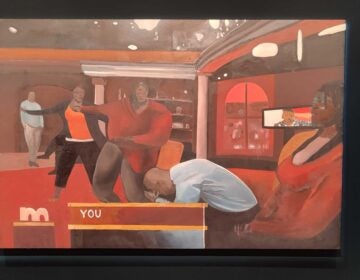This season, the stage belongs to Shakespeare
All the world’s a stage – and this season that stage belongs to Shakespeare. This spring will feature at least nine productions of Shakespeare plays in the Philadelphia region.
Take the Shakespeare at the Movies quiz.
All the world’s a stage – and this season that stage belongs to Shakespeare. This spring will feature at least nine productions of Shakespeare plays in the Philadelphia region.
[audio:100310PCSHAKES.mp3]
This production of Romeo and Juliet at the Arden Theater hits the ground running. Tybalt and Benvolio each stir afoot to seek a foe.
“So we establish the world of the play at the very beginning,” says artistic director, Terry Nolan. “It’s a world of violence.”
Nolan says this modern staging of Romeo and Juliet is, by its nature, anachronistic. There are sneakers and skinny jeans mixed with olde-English “thees” and “thous” – gangster posturing with daggers and batons.
A successful Romeo and Juliet is all about the fight scenes.
“There are these great swordfights,” says Nolan. “And so we’re talking about contemporary clothes –contemporary clothes but with everyone wearing swords. So it’s a disconnect. We all realize that we don’t go around carrying swords. So it’s finding a way that we are referencing our world, but it’s still its own creation.”
These violent delights have violent ends: the star-crossed lovers rush to their fate as they have for more than 400 years. This was the first time Madeline Elwell of Philadelphia’s Masterman High School had seen the play. She was particularly taken by the balcony scene.
“Especially when he kissed her – that was very interesting,” said Elwell. “I did not know that he could do that. It was so full of love and emotion. ‘I love you.’”
The Federal government is pleased Elwell swooned. The National Endowment for the Arts sends money to theaters to make sure Shakespeare stays on the boards. Widener University English professor Annalisa Castaldo says: that’s a wise move.
“Aside from the Beatles, it’s hard for there to be a reference that everybody knows,” says Castaldo. “Romeo and Juliet, Macbeth, Hamlet, Othello – ‘First thing you do, let’s kill all the lawyers.’ There are a lot of things about Shakespeare that whether you’re 13 or 93, you kind of go, ‘oh yeah, I get that.’ We need, as a culture, to have things in common – otherwise we can’t talk to each other.”
The Arden hadn’t produced Shakespeare for 12 years. Terry Nolan says you have to work hard to make it work.
“At its worst, it’s the worst kind of theater – confusing and boring,” says Nolan. “But when it works, when it finds that spot, it’s a really remarkable thing.”
Seven other area theaters are taking on the Shakespeare challenge this season, including two by the Philadelphia Shakespeare Theater.
Professor Castaldo says part of Shakespeare’s appeal is that his plays can take anything you throw at them – any interpretation, any angle. Have something to say about Hamlet? Bring it on.
“Freud got a hold of it and announced that what it was really about Hamlet’s incestuous desire for his mother,” says Castaldo. “Nobody before Freud said this guy is in love with his mother. It was an invention of Freud, but once it got going it took off and reflected current psychological interpretation.”
So every generation gets to knock the rust off the plays and try to make them fresh.
Sort of like what Shakespeare himself did 400 years ago. The story of Romeo and Juliet was not his invention. It was a much older Italian poem, first published in English in 1562 – that’s two years before Shakespeare was born.
“It’s described as rather dull,” says Elizabeth Fuller, a librarian at the Rosenbach library in Rittenhouse Square. In her hands is an original copy of a book which Shakespeare most likely read has an original copy of the book published in 1562 – a Rennaissance-age Reader’s Digest called “A Palace of Pleasure” from which the Bard cribbed story ideas.
The shelves around Fuller are heavy with original Shakespeare folios and quartos. He most likely over-wrote his plays intentionally. By giving directors too much material to work with, he enabled them to tailor a play to any occasion.
“T.S. Eliot called Hamlet a loose, baggy monster,” says Professor Castaldo. “That’s a wonderful description and absolutely true – you can throw anything at these plays, and they will catch and hold it. It’s impossible to find a way into the plays that doesn’t work.”
Next season, the Wilma Theatre on the Avenue of the Arts will test that theory, producing Shakespeare for the first time in its 36-year history. Age cannot wither, nor custom stale Shakespeare’s infinite variety.
WHYY is your source for fact-based, in-depth journalism and information. As a nonprofit organization, we rely on financial support from readers like you. Please give today.




